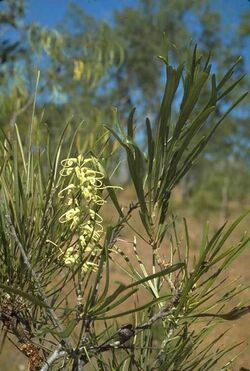Biology:Grevillea mcgillivrayi
| Grevillea mcgillivrayi | |
|---|---|

| |
| Near Mareeba | |
| Scientific classification | |
| Kingdom: | Plantae |
| Clade: | Tracheophytes |
| Clade: | Angiosperms |
| Clade: | Eudicots |
| Order: | Proteales |
| Family: | Proteaceae |
| Genus: | Grevillea |
| Species: | G. mcgillivrayi
|
| Binomial name | |
| Grevillea mcgillivrayi I.M.Turner[1]
| |
| Synonyms[1] | |
| |
Grevillea mcgillivrayi is a species of flowering plant in the family Proteaceae and is endemic to Queensland in Australia. It is slender tree with linear to strap-like leaves, and cylindrical clusters of white to cream-coloured flowers, the style sometimes turning pink with age.
Description
Grevillea macgillivranyi is a slender tree that typically grows to a height of 4–15 m (13–49 ft). The leaves are linear to strap-like, 80–300 mm (3.1–11.8 in) long, 4–10 mm (0.16–0.39 in) wide the edges rolled under, the lower surface silky-hairy and the midvein is prominent. The flowers are arranged in cylindrical clusters, sometimes branched, 80–150 mm (3.1–5.9 in) long, the flowers at the bottom of each cluster opening first. The flowers are white to cream-coloured and glabrous, the style sometimes turning red with age, the pistil 33–42 mm (1.3–1.7 in) long. Flowering occurs from July to September, and the fruit is a lens-shaped follicle about 21–28 mm (0.83–1.10 in) long.[2]
Taxonomy
This grevillea was first formally described in 1975 by Donald McGillivray who gave it the name Grevillea coriacea,[3][4] but that name is a nomen illegitimum because it was already used for a fossil species. In 2014, Ian Mark Turner changed the name to Grevillea mcgillivrayi in Annales Botanici Fennici.[5][6]
Distribution and habitat
Grevillea mcgillivrayi grows in forest and woodland, often on dry slopes, and is found in north-eastern Queensland from north of Cooktown to Mount Mulligan and Mount Molloy.[2]
Conservation status
This grevillea is listed as of "least concern" under the Queensland Government Nature Conservation Act 1992.[7]
References
- ↑ 1.0 1.1 "Grevillea mcgillivrayi". Australian Plant Census. https://biodiversity.org.au/nsl/services/apc-format/display/4510517.
- ↑ 2.0 2.1 "Grevillea coriacea". Australian Biological Resources Study, Department of Agriculture, Water and the Environment: Canberra. https://profiles.ala.org.au/opus/foa/profile/Grevillea%20coriacea.
- ↑ "Grevillea coriacea". APNI. https://id.biodiversity.org.au/instance/apni/523391.
- ↑ McGillivray, Donald (1975). "Australian Proteaceae: New taxa and notes.". Telopea 1 (1): 19–20. doi:10.7751/telopea19753102.
- ↑ "Grevillea mcgillivrayi". APNI. https://id.biodiversity.org.au/instance/apni/523391.
- ↑ Turner, Ian M. (2014). "Names of extant angiosperm species that are illegitimate homonyms of fossils.". Annales Botanici Fennici 51 (5): 307. doi:10.5735/085.051.0506. https://www.jstor.org/stable/43746271. Retrieved 4 July 2022.
- ↑ "Species profile - Grevillea macgillivrayi". Queensland Government Department of Environment and Science. https://apps.des.qld.gov.au/species-search/details/?id=35802.
Wikidata ☰ {{{from}}} entry
 |

